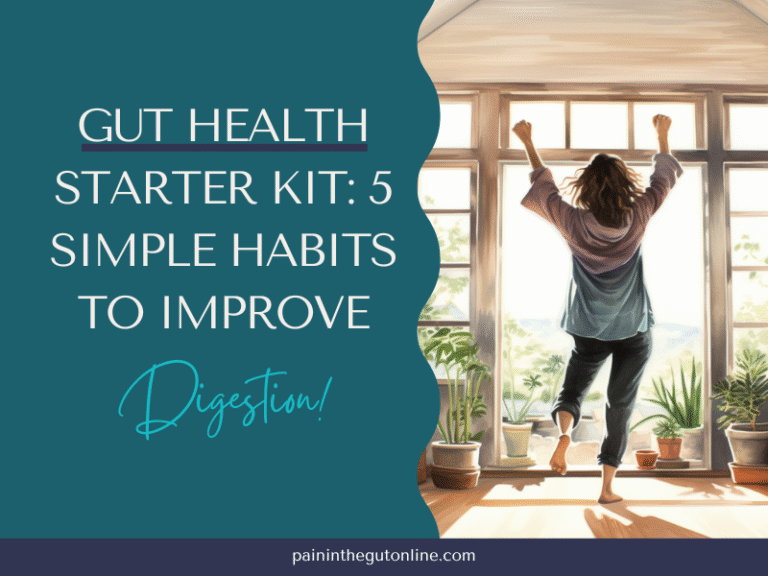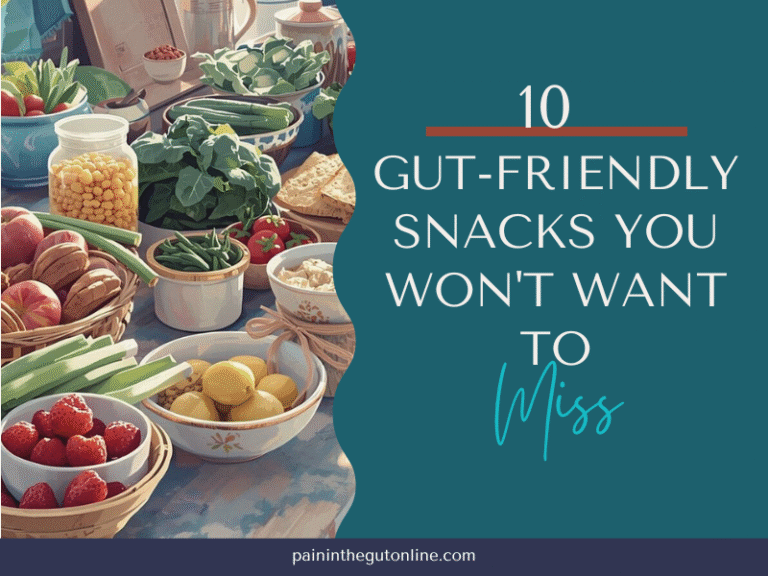GROCERY STORE HACKS
7 min read/ 1481 words

Since you’re here, I think it’s safe to say you haven’t been feeling all that great. I bet you are having digestive issues, like excessive gas and uncomfortable bloating. You may even be experiencing skin problems, mood swings, mental health concerns, trouble sleeping, and/or a weakened immune system. If you’re ready to put these symptoms in your past, read on to learn my 6 grocery store hacks for better gut health.
The grocery store can be one of the most challenging places to visit when working to improve your gut health. It’s tough to figure out how to navigate those aisles and determine which foods to buy and which ones to avoid.
Lucky for you, you found this article designed to help you with the knowledge and tools you need to handle the grocery store like a pro.
In this article, I will:
- help you determine which isles to avoid at the grocery store
- teach you the types of food you should avoid or limit
- show you alternatives to shopping at the grocery store
- Share 5 foods you should always have on hand
Table of Contents
6 Grocery Store Hacks for Better Gut Health:
The grocery store is a tricky place to maneuver. It is full of foods strategically placed to be as tempting as possible. A good rule of thumb to follow at the grocery store is to stick to the outside aisles. This is usually where you will find produce, meat, and dairy and will help you avoid junk food. Just be careful at the checkout lane—eyes forward now, you can do it!
- Artificial Sweeteners & Refined Sugars
- Fried Foods
- Processed Foods
- GMOs
- Alcohol
- End caps
Keep reading while I discuss each one of these in more detail. Let’s get into it!
Artificial Sweeteners & Refined Sugars
While all sugar should be limited in your diet, these types of sugars, in particular, can harm your overall health.
Artificial sweeteners are just a mix of chemicals created in a lab a few decades ago meant to help make things taste sweet without adding calories. They were supposed to be a healthy alternative to refined sugars. Now, while the original intention was to improve your health, the reality is that they cause more health problems and offer exactly zero health benefits. Plus, at the end of the day, they actually make you crave more sugar, not less. they can mess with the balance of your gut biome as well as cause glucose intolerance, which can lead to type-2 diabetes with long-term use.
Refined sugars have been chemically processed, leaving little or no nutritional value. While all sugars should be kept to a minimum in your diet, sticking to unrefined sugars like honey, agave, coconut sugar, and fruit will at least provide additional nutrients like fiber, protein, vitamins, minerals, and antioxidants.
Fried Foods
Fried foods are difficult for your body to digest. This is because of the oils used in the frying process. These oils contain saturated and trans fats, which are bad for your health and can cause digestive unrest, such as increased gas, bloating, and pain.
Chemically produced trans fats have been linked to increased production of LDL cholesterol, which is known to cause heart disease, heart attack, blood clots, and even diabetes. Plus, these oils may promote bad bacterial growth in the gut biome.
These fats are found in the following foods:
- anything fried and in the freezer section, such as french fries, fish sticks, or mini corndogs
- margarine, which is meant to be a healthier alternative to real butter
- certain non-dairy creamers
- anything that contains partially hydrogenated oils, sometimes found in certain drinks, microwave popcorn, premade baked goods and snacks, and refrigerator biscuits, to name a few.
Processed Foods
Highly processed foods are generally not great for your health. They shouldn’t be a big part of your regular diet, but that doesn’t mean you should cut them out completely.
An occasional treat shouldn’t be a problem. When processed foods make up more than 10-15% of your diet, they can cause bigger problems for your health. The same goes for sugar.
The issue with processed foods is that they usually have low nutritional value, tend to be very low in fiber, are loaded with sugars or artificial sugars, are high in sodium, and are filled with preservatives.
Your gut biome thrives on a diet high in fiber and low in processed food ingredients.
Here are a few common processed foods you should limit or avoid in your diet:
- cured meats and lunch meats
- ready-made frozen meals
- ready-made pies, cookies, and cakes
- certain cheeses
- breakfast cereals
- store-bought bread(for the most part)
Genetically Modified Organisms(GMO’S)
GMOs are Genetically Modified Organisms. This means food’s DNA(genes) is modified or changed somehow. While the reasons behind these modifications are good ones, the possible side effects are not.
One major reason corn is modified is so the crops can withstand strong herbicides, such as Roundup. A trace amount of this highly toxic carcinogen remains within the corn, which we then eat. Some modifications also reduce the nutritional value of the food.
GMOs affect more than just your gut. They also can cause the following health issues:
- obesity
- fatigue
- food allergies/intolerances
- anxiety/depression
- memory problems
- insomnia
Alcohol
I’m not going to tell you not to drink alcohol; don’t worry, I’m not your mom. But what I will do is arm you with some information about how alcohol can affect your microbiome, and you can choose to do whatever you want with this information; deal?
Drinking alcohol on occasion probably won’t affect your gut too much. Drinking red wine a few times a week is actually beneficial to you because it contains polyphenols, which are good for your gut. Polyphenols are antioxidants that are great for your overall health.
However, drinking in excess can be harmful to your gut health as well as your overall health. Excessive amounts of alcohol can cause inflammation, digestive disruption, and an overgrowth of bad bacteria in your gut.
Anytime you are going to be drinking alcohol, be sure to also drink plenty of water before, during, and after consumption. It’s also helpful to eat a meal before drinking to help reduce these effects.
Fun Fact: People have different levels of alcohol tolerance because of the number of good bacteria in their gut. The more good bacteria they have, the more efficiently their body can metabolize alcohol.
End Caps
End caps at grocery stores usually hold items that are either on sale or that the store is trying to push. These items are rarely healthy choices and should, therefore, be avoided.
As I mentioned before, it’s always better to stick to the grocery store’s outside aisles. Try to shop in the produce, meat, and dairy sections and skip most inner aisles that contain candy and chips. Obviously, you won’t always be able to pass up on the inner aisles since you must buy things like peanut butter, miso paste, pasta or rice, and more.
Having a list and sticking to it is the best way to avoid foods that may harm your gut health.
Another great way to do this is to use an online grocery service such as Imperfect Foods, Thrive Market, or Walmart Grocery Delivery. You can order everything you need and have it delivered straight to your door, completely bypassing the store and its temptations.
So, what should you eat for better gut health?
Now that I talked a whole lot about foods you should avoid, let’s take a minute to go over some foods that are fantastic for your gut.
- Fermented foods such as Kombucha or yogurt
- High-fiber foods like legumes and oats
- Garlic
- Onions
- Collagen-boosting foods such as salmon or bone broth
Maybe seeing this list has made you ask how to incorporate these foods into your daily diet. I understand completely. It can be difficult and time-consuming to figure out what to eat to improve your gut health. Learn the Best Foods to Eat for Gut Health.
I can help you save time and show you what to eat to keep your gut happy and healthy. Plus, meal planning is just plain hard to do. Trying to fit all the right ingredients while having little or no food waste can be tricky.
Our 36 Healthy & Delicious Recipes for Gut Health can help.
This ebook includes 36 anti-inflammatory recipes, including breakfast, lunch, dinner, and snacks. You’ll also get a sample meal plan and tips for success. As a bonus, you’ll download our FREE fillable Food Journal (no printing required) and Gut Healthy Fast Food Options mini-guide.
And remember these six grocery store hacks the next time you plan a trip to the grocery store; they will make all the difference in your gut and health!
Looking for daily inspiration to keep you going on your gut health journey? Follow me on TikTok for more!







